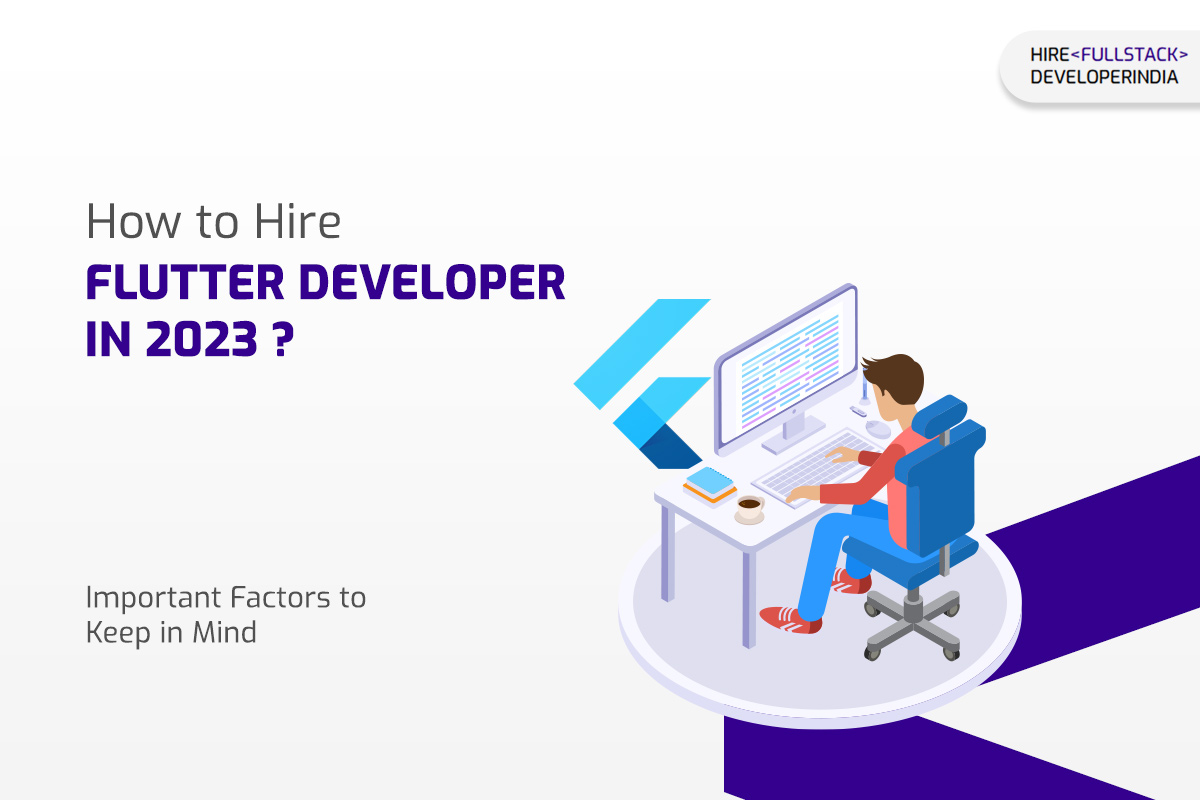Flutter is a framework from Google used extensively for mobile app development. It uses the Dart programming language and allows developers to build cross-platform mobile apps for Android and iOS using a single codebase. Flutter includes a rich set of customizable widgets, and a fast development cycle with “hot reload,” delivering superior performance, making it a popular choice for any flutter app development company to build high-quality mobile apps.

1. The Most Commonly Used Technologies
The most commonly used technologies by Flutter developers in conjunction with Flutter are:
- Firebase: A comprehensive mobile development platform with a wide range of services, including cloud storage, real-time database, authentication, and more.
- Google Maps: A mapping service to add maps and location-based features to Flutter apps.
- SQLite: A self-contained, serverless, zero-configuration, transactional SQL database engine to store and retrieve data within Flutter apps.
- JSON: A lightweight data-interchange format to exchange data between Flutter apps and servers.
- REST APIs: A set of rules for accessing web-based software applications to allow Flutter apps to communicate with servers and other services.
2. Provide Numerous Benefits
Flutter is the ideal choice for many programmers, providing numerous benefits:
- Cross-platform compatibility: Flutter allows developers to build apps for Android and iOS from a single codebase, saving time and resources.
- Fast development cycle: Flutter’s “Hot reload” feature enables fast development cycles and its excellent documentation makes for a smooth learning experience.
- Good performance: Flutter apps are known for good performance, making it a suitable choice for building high-performance apps.
- Growing community: Flutter framework has a growing community of developers, offering a large pool of talent to choose from.
3. Key Skills Required
Flutter app developers specialize in building mobile applications using the Flutter framework. They are responsible for designing, building, testing, and maintaining mobile apps that are built with Flutter. To become a Flutter developer, one typically needs to have a strong foundation in computer science and software engineering and should be proficient in the Dart programming language.
Flutter helps developers create high-performance, scalable applications with beautiful, functional user interfaces for Android and iOS. With Flutter, developers can quickly build powerful apps that provide an engaging user experience and are optimized for maximum performance. Flutter developers may work as part of a team in a software development company, or they may work as freelancers, building apps for a variety of clients. They may also work in-house at a Flutter app development company, creating their own mobile apps or for clients.
To become a successful Flutter developer, one must have a keen eye for detail, excellent communication skills, and a passion for delivering high-quality applications.
- Proficiency in Dart:
Flutter is built with the Dart programming language, so a developer needs to be proficient in this language. - Mobile app development knowledge:
A good understanding of the challenges and considerations involved in this type of development is a must. - Experience with Flutter
Flutter offers a unique set of features and capabilities, and familiarity with the framework is essential. - Problem-solving skills:
The ideal candidate should also possess strong problem-solving skills, as this is an important component of any development process. - Smooth communication skills:
It’s important for the developer to effectively communicate ideas and work with the rest of the team. - Familiarity with Git and version control:
Flutter developers should be familiar with using version control systems like Git to manage and track changes to the underlying code.
4. Roles and Responsibilities to Expect
A Flutter developer is responsible for building cross-platform mobile applications using the Flutter framework. The specific roles and responsibilities of a Flutter developer include:
- Writing and maintaining clean, efficient, and well-documented code.
- Working with a team of developers, designers, and product owners to ensure the successful deployment of the application
- Resolving issues in the codebase via debugging.
- Testing applications for usability and compatibility on different devices
- Keeping abreast of the ever-changing landscape of the Flutter ecosystem
- Code review participation so that the team members are presented with valuable feedback.
- Troubleshooting, debugging and resolving issues that arise in the application
5. In-House V/S Remote Flutter Developers
When it comes to choosing between in-house and remote Flutter developers for your Flutter app development project, there are a few key considerations to take into account.
In-house Flutter developers:
Pros:
- Being physically present in the same location as the rest of the team, it does facilitate communication and collaboration.
- A better understanding of the company’s culture and goals.
- Easily integrate into the company’s existing processes and systems
Cons:
- More expensive to hire and maintain, as they need a workstation, benefits, and potentially additional support staff.
- Less flexible in terms of availability, as they are present only during regular business hours.
Remote Flutter developers:
Pros:
- Since they can be hired from anywhere, one can tap into a larger pool of talent.
- More flexible in terms of availability, as they can work from anywhere outside regular business hours.
- Less expensive to hire and maintain, as they do not require a workstation, benefits, and potentially additional support staff.
Cons:
- Communication & collaboration can be a challenge when working with remote Flutter developers, as they are not physically present in the same location as the rest of the team.
- They lack a strong understanding of a company’s culture and goals due to a lack of in-person interaction with the rest of the team and the absence of company processes and systems.
It is important to evaluate the specific needs of your project and consider which option best meets those needs. Professional guidance can be invaluable in this decision-making process, helping you to make the best choice for your Flutter app development project.


